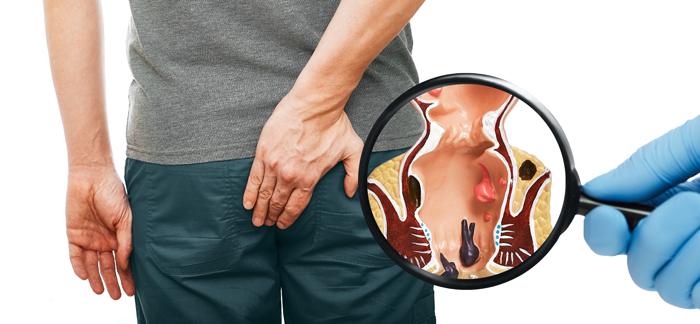Haemorrhoids Treatment in C-scheme, Jaipur
Haemorrhoids are one of the reasons which cause rectal bleeding and irritation in the anal region. Around 50% of the people have haemorrhoids by the time they reach the age of 50 years. Common symptoms of haemorrhoids include discomfort, irritation, or pain in the anal region.
What Are Hemorrhoids?
Haemorrhoids are the bulged or swollen veins that arise in the lower part of the rectum and the anus. Generally, these are known as piles. Almost three out of four adults in the population develop haemorrhoids. Obesity, frequent lifting of objects, or overstress on the body increases the risk of getting haemorrhoids. During the process of excretion, the walls of the blood vessel stretch so thin that it irritates the veins by bulging.

What Are the Types of Hemorrhoids?
Depending on the location and development of the swollen veins, haemorrhoids are classified into three types:
- External Hemorrhoids: As the name suggests, these are developed around the anal region. Usually, because of the nerves which sense pain, you can feel them.
- Internal Hemorrhoids: These developed inside the anal region or the rectum and cannot be seen.
- Thrombosed haemorrhoids: It occurs when there is obstruction of blood flow which results in a blood clot in the vein. These blood clots turn purple or blue.
Symptoms that indicate external haemorrhoids include:
- Itching around the anal region
- Discomfort
- Pain while sitting/li
- Blood
- Swelling around the anal region
- Painful bowel movement
Symptoms that point towards internal haemorrhoids include:
- Bloody stools
- Pain/discomfort
- Irritation
- Faecal leakage
Symptoms that indicate Thrombosed Hemorrhoid:
- Severe pain
- Swelling
- Itching
- Inflammation
- Hard lump in the anus
What Are the Causes of Hemorrhoids?
A certain amount of pressure builds up in the lower part of the rectum which stretches the veins resulting in swelling. It might happen because of the following reasons:
- Constipation
- Obesity
- Frequent heavy lifting
- Chronic diarrhoea
- Strain during bowel movements
- Genetically inherited
- Pregnancy
- Spending a lot of time sitting on the toilet
- Low fibre-diet
When to see a doctor at Apollo Spectra, Jaipur?
Normally, haemorrhoids are not dangerous to the body. It usually goes away in a week. However, if the bleeding still occurs, it is recommended to go see a doctor immediately.The doctors at Apollo Spectra, Jaipur will initially ask you about your symptoms and note whether it is genetically passed.
Your doctor will perform a physical exam. It involves looking at your anus to check whether there is swelling or itched scars or rashes. This is performed if you are showing symptoms of external haemorrhoids.
The doctor performs a digital rectal exam if he notices the symptoms leading to internal haemorrhoids. To do this, he wears a pair of gloves and uses lubrication to insert his finger in your anus to ensure whether there are lumps or swelling.
However, to confirm internal haemorrhoids, the doctor performs the following tests:
- Colonoscopy
- Anoscopy
- Sigmoidoscopy
Request an appointment at Apollo Spectra Hospitals, Jaipur
Call 1860 500 2244 to book an appointment.
How Are Haemorrhoids Treated?
Haemorrhoids are treatable and are not dangerous. Normally, it gets cured on its own after a week. Eating a fibre-rich diet like fruits and vegetables can contribute to relieving the pain and itching. Drink more water to avoid straining during the passage of bowel movements.
Applying ice packs can the area where it itches or is swollen. If the itching, swelling, or blood in the stool persists, seeking medical attention is necessary. The doctor might suggest either one of the following treatments:
- Surgical methods: If the other forms of treatments are not helping then there is a chance of larger haemorrhoids development. In this case, the doctor uses infrared light, lasers, or chemicals to reduce and get rid of them.
- Non-surgical methods: Creams, medications or liquids helps in relieving the pain and itching.
Conclusion
Haemorrhoids are not dangerous. Haemorrhoids can be prevented by following a proper diet or improving daily practices of exercise and avoiding sitting on the toilet for a longer period.
Complications are rare but Haemorrhoids might lead to blood clots, anaemia, skin tags, or infections.
There is no risk that Hemorrhoids increase the risk of getting colorectal cancer. However, as both the condition has a common symptom of rectal bleeding, it is recommended to test for both the conditions.
- Applying Aloe-vera
- Using wet/soothing wipes
- Cold compressors
- Stool softeners
- Over-the-counter creams
Symptoms
Our Top Specialities
NOTICE BOARD
CONTACT US
CONTACT US
 Book Appointment
Book Appointment


.svg)
.svg)
.svg)
.svg)








